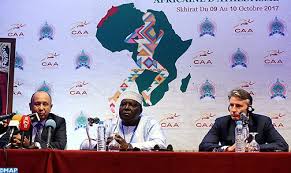
Morocco’s King Calls for New Strategy to Overcome Dysfunctions of Athletics at Home, in Africa
 King Mohammed VI of Morocco has called for the adoption of a new strategy to overcome the structural dysfunctions marking athletics in the African continent, underlining that the performances and records of African athletes enhance the African identity, make the continent better known and increase its influence.
King Mohammed VI of Morocco has called for the adoption of a new strategy to overcome the structural dysfunctions marking athletics in the African continent, underlining that the performances and records of African athletes enhance the African identity, make the continent better known and increase its influence.
In a message to the 27th Congress of the African Athletics Confederation, which kicked off in Skhirat on Monday (October 9), the sovereign deplored the fact that track and field in African countries remains structurally dysfunctional. “Such a situation can be overcome only if we adopt a well thought-out strategy to keep abreast of successive developments in world athletics,” he said.
Expounding the broad lines of the strategy that is likely to promote athletics in the continent, he pointed out that “this strategy must be based on good governance, the honing of talents, capacity building through modern training and coaching systems, the consolidation and upgrading of infrastructure and efforts to reconcile grassroots athletics with elite track and field”.
“The strategy should embrace the private sector through effective partnerships that provide for the financing of development plans in the field of athletics. This is a real issue for a number of African countries,” the King added.
After he recalled that Morocco adopted, a decade ago, a contract program for the development of national track and field meant to increase the number of active athletes while also training elite competitors, King Mohammed VI called for “consolidating training and capacity building systems and developing the necessary infrastructure based on modern, sophisticated work methods to accompany athletes properly and ensure optimal use of the resources available”.
It is also important to combat doping in sport as well as any dishonorable practices, which are at odds with morals, sportsmanship and fair competition, he said. Moreover, he added, “we expect this strategy to allow for the optimal use of the resources available in terms of training world-class athletes and preserving Morocco’s record and its standing as one of the leading nations in this field”.
Underlining Morocco’s commitment to serving African causes, including in the sports sector, and its active involvement in African sports decision-making institutions, particularly the Confederation of African Athletics, the Sovereign pointed out that “consistent with a solidarity-based policy applied across the board, Morocco is both willing and committed to put its experience as well as its infrastructure in the sports sector in general, and in athletics in particular, at the disposal of African sister nations through the adoption and implementation of innovative, participatory and mutually beneficial approaches as well as South-South cooperation mechanisms”.
At a press briefing on the eve of the Congress, chairman of the Confederation of African Athletics (CAA), Hamad Kalkaba Malboum, and president of the International Association of Athletics Federations (IAAF), Sebastian Coe, have both hailed Morocco’s key role in promoting athletics in Africa and its commitment to the fight against cheating and doping.
The Congress, which is bringing together over fifty African federations, will enable the CAA to examine the situation of African athletics.
The decision to hold the event in Morocco, initially planned in Dakar, CAA’s headquarters, was taken in London last August, on the eve of the 51st IAAF Congress.
